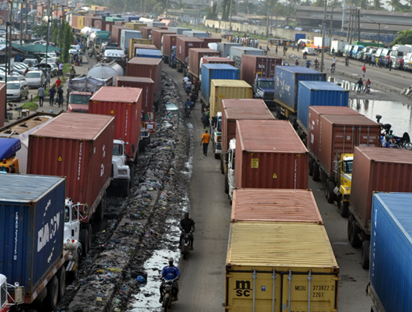
With just few days to the yuletide, importers and clearing agents are currently groaning over delays in evacuating their cargoes from the Apapa and Tin Can Island ports as the traffic gridlock in Apapa has taken a worrisome dimension this week, with large volumes of cargo trapped at the ports.
There are also concerns that ship queues are gradually returning on the waters due to space constrained inside the port terminals, as cargo delivery has considerably slowed down.
Apart from the usual yuletide rush, the closure of Nigeria’s land border, which led to increase in volume of cargo to the seaports, has also worsened the chaotic traffic situation.
SHIPS & PORTS correspondents who monitored the situation around Apapa and environs on Wednesday and Thursday observed that the traffic situation has worsened with the road from Costain to Ijora down to Eko Bridge taken over by trucks and tankers. The situation is not different on the Mile Two- Oshodi route through to Tin Can Island Port.
The situation, it was gathered, has also led to a sudden rise in haulage cost by truck owners who blame the gridlock on the dilapidated road infrastructure.
Speaking with SHIPS & PORTS, President, National Association of Government Approved Freight Forwarders (NAGAFF), Increase Uche, said apart from the deplorable state of the port access road, the traffic gridlock is made worse due to increase in cargo inflow through the port, occasioned by the border closure as more trucks are being diverted to the seaports.
“The border closure compounded the whole traffic problem. We have predicted that if the borders remain close, the influx of cargo through the port will triple and that is what is happening now. Accessing the port is a big challenge now; from morning till evening, one is on the road. Even when you succeed in processing your document, at the end of the day, getting trucks with the high charges of haulage is another problem. Presently, the average cost of moving a 20 feet container from the port is as high as N400,000 not minding where you are going while a 40-feet container going interstate has gone up as high as one million naira. The port access road issue does not only concern linkage between Apapa and Tin Can to Costain, it affects almost the whole highways that link up the markets and industrial areas in Lagos.
“The situation is so pathetic because there is no linkage in terms of connectivity and all the pressure is now on the road. We have been advising government to put structures in place even if it is palliative, but it must be enduring. From there, we can graduate to medium term solution. NPA told us that they are developing electronic call up system that will start in August. Up till today, we don’t know what happened to that. We even asked them to perfect the manual call up system, they said no, and today we have neither the manual nor the electronic call up,” he said.
Chairman, Association of Maritime Truck Owners (AMATO), Chief Remi Ogungbemi, said the traffic situation has become unbearable, even as he called on the government to wind down the presidential task team set up to address the Apapa gridlock as it has failed to deliver its mandate.
He said, “I must say it loud and clear that things have gotten out of hand traffic-wise within Apapa and Tin Can ports. I want to also say it loud and clear that the task team should be scrapped. The earlier they leave, the better.
“Concerning the gridlock, a lot of things has set in. Familiarisation has set in, preferential treatment has set in to the extent that we have many groups now as cartel and if you are not a member of these groups, your truck cannot pass. So I think it is high time that the authority winds down the task team so that they can bring fresh hands especially if they must have task team.”
Speaking on the sudden increase in haulage cost, Ogungbemi said, “In Nigeria, we run three economies. You buy your product and you know how much you sell it so that you can make profit. If the truckers now consider the running cost of their trucks into the port, of course, they will add it to whatever charges they want to charge. But I want to tell you that it is temporary and it is not official because now there is no standard, it all depends on the distance, location and power of bargaining from both sides. But the major challenge is the traffic situation that is being compounded by the conditions of the road.”
